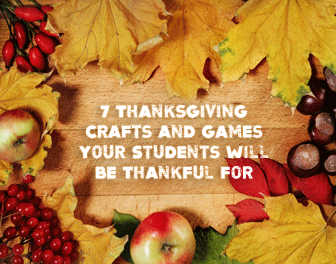7 Thanksgiving Crafts and Games Your Students Will Be Thankful for


The following activities will give them a chance to learn about the holiday, have fun, and still put their language learning to the test. Try one or all of them as they suit your class.

If your students welcome picture books in the classroom, take a look at the book Run Turkey Run. In this classic children’s book, turkey must find a way to escape the farmer before the thanksgiving feast. After reading the book, see how many verbs your students can come up with to describe how turkey moves away from the farmer. If you like, have your students illustrate their pages and compile them into a class book.
Do your students like to debate controversial topics? If so, this activity will be right up their alley. In recent years, many stores have opted to open for shopping on the evening of Thanksgiving Day rather than waiting till Friday morning for holiday sales. This means that employees must cut short or miss celebration with their families. Do your students think it is right for stores to be open on Thanksgiving? Or should they remain closed for the holiday in favor of opening very early the next day? Have your students discuss this in groups or separate the class into two teams to debate the topic.
Odds are your ESL students have never planned a Thanksgiving feast. There’s no better time than the present to change that! Have a class discussion about the different foods that Americans traditionally eat at thanksgiving (turkey, stuffing, mashed potatoes, sweet potatoes, pie, etc.). Then have students, either individually or in pairs, design a menu for the holiday and make a shopping list for what they will need. Be sure to have internet access or several cookbooks on hand for your student to look up the ingredients they will need to perfect their Thanksgiving dishes.
All of your students might not celebrate Thanksgiving, but everyone has family traditions that they follow around the holidays. Have your students write a composition about a family tradition that they follow. What do they do? When do they do it? Why is it important to them? If you like, ask volunteers to share their composition with the class or post them all on a bulletin board for students to read at their leisure.
It wouldn’t be Thanksgiving without a turkey craft. And turkeys are great for introducing or reviewing groups of vocabulary to your students because of all their beautiful feathers. You can make this activity as simple or as intricate as you like. The important part is this. Students will be grouping related words by writing each individual word on a turkey feather. Those feathers will then be attached to or drawn on the turkey’s body. If you like, choose one word to start (for example, talk) and have students think of synonyms to put on the turkey feathers (whisper, shout, say, blurt, etc.) or have students list words that make up minimal pairs (bay, day, lay, jay, hay, etc.) You can find an example and free templates for this turkey activity here.
Are you looking for a simple way to teach your students some Thanksgiving related vocabulary? Try these simple and free print and go activities.
Turkeys are a great excuse to bring figurative language into the classroom this November. Try giving your students a list of turkey idioms and have them guess what the idioms mean. Then give them a list of the real meanings and see if they can match the expressions to their definitions. You might want to include the following expressions: quit cold turkey, talk turkey, like turkeys voting for Christmas, a turkey shoot, I’m stuffed, stuff it, eat like a bird, and be a turkey. Also feel free to expand your idiom lesson by including idioms that mention other animals.
If you are looking for a speaking activity for your students, you might want to try this activity with Thanksgiving specific situations. To play the game, have students get in groups of three or four, and give each group a set of cards, each card stating a possible Thanksgiving scenario. For some sample situations, look here. Students separate and shuffle the cards and place the stack face down in the middle of them. One person draws a card and must talk for one minute without stopping about what he or she would do in that situation. There are no right or wrong answers; the goal is to simply keep talking without stopping for the full minute and stay on topic if possible.
If your students are intermediate or advance, they might enjoy reading this short story “Thank You, M’am” by the famous American poet Langston Hughes. It’s a story about a boy who got a good thing he didn’t deserve. After reading it, have volunteers share a time when they didn’t get something bad they deserved or a time when they got something good that they didn’t deserve.
No turkey wants an invitation to Thanksgiving diner. Have your student play the role of the turkey as he writes a persuasive letter to the farmer. The letter should try to convince the farmer not to have the turkey for Thanksgiving dinner. You can find directions on how to write persuasively here.
Thanksgiving is a time of celebration and an opportunity to focus on the good things we have been given. As you celebrate the holiday in your ESL classroom, be sure to give your students a chance to focus on what they are thankful for and to share their blessings with those around them.